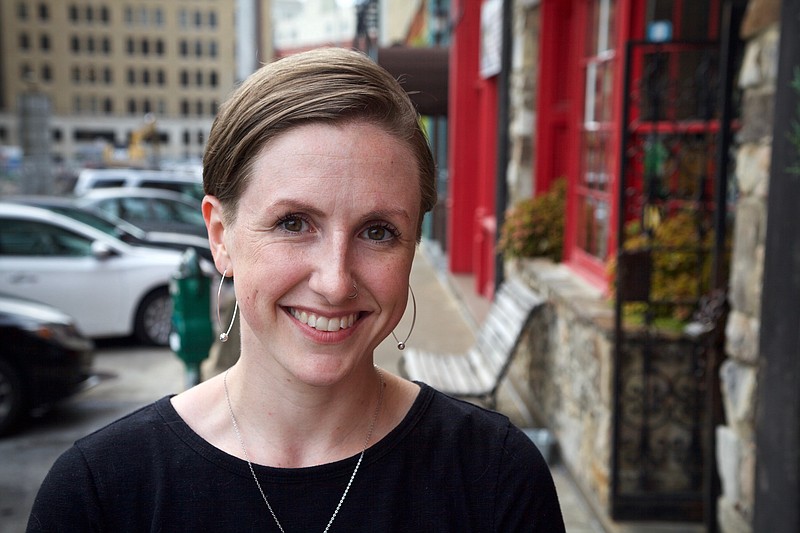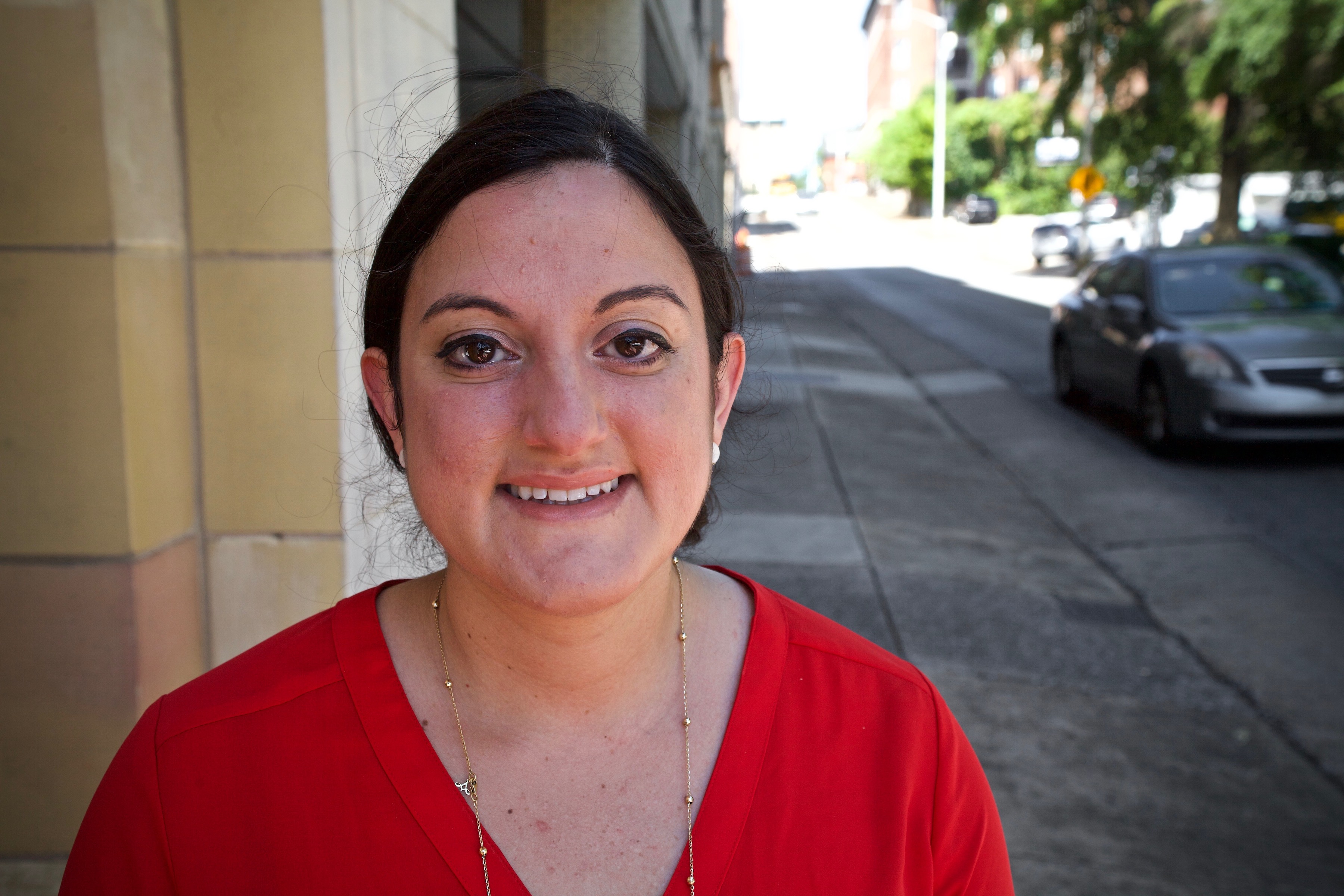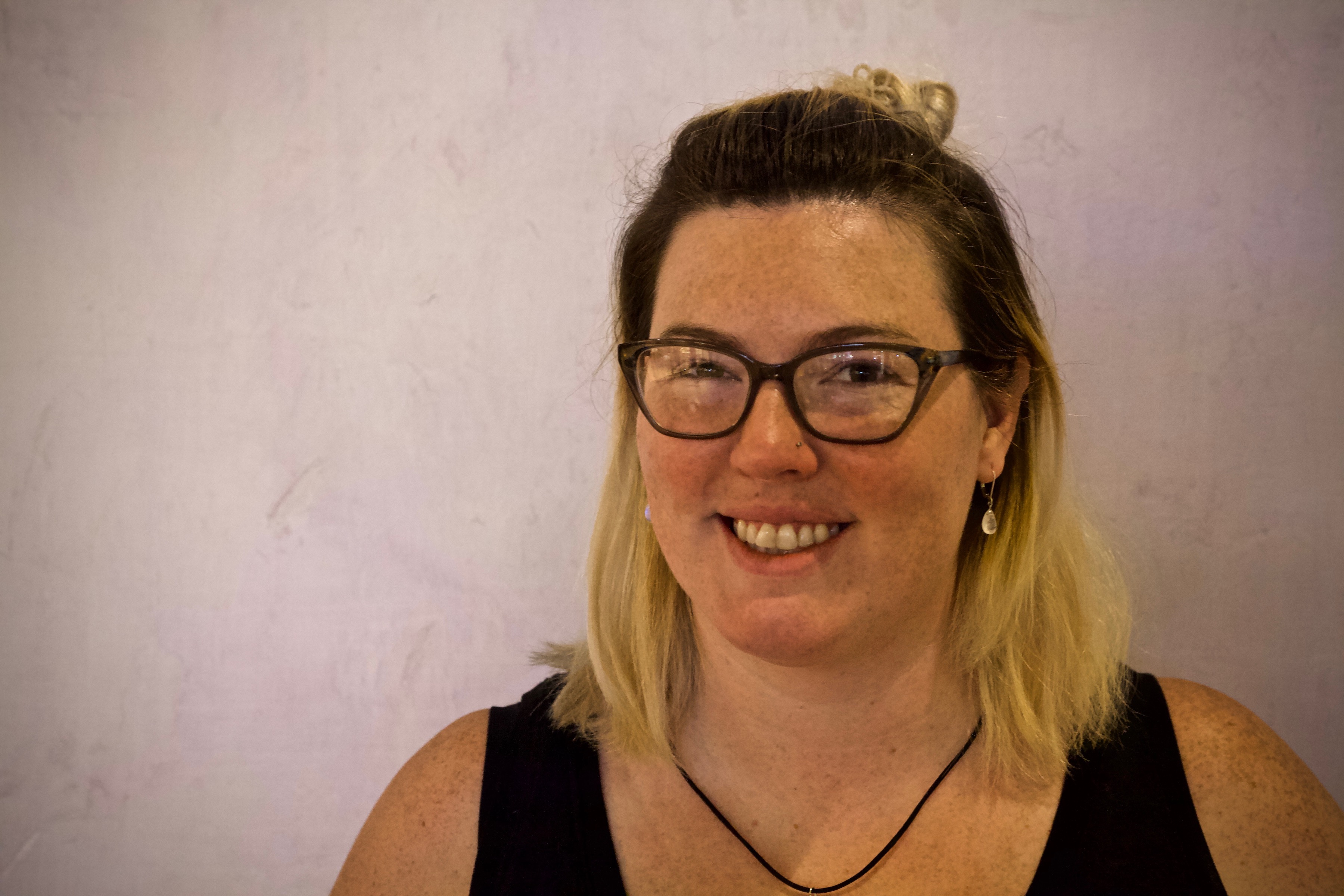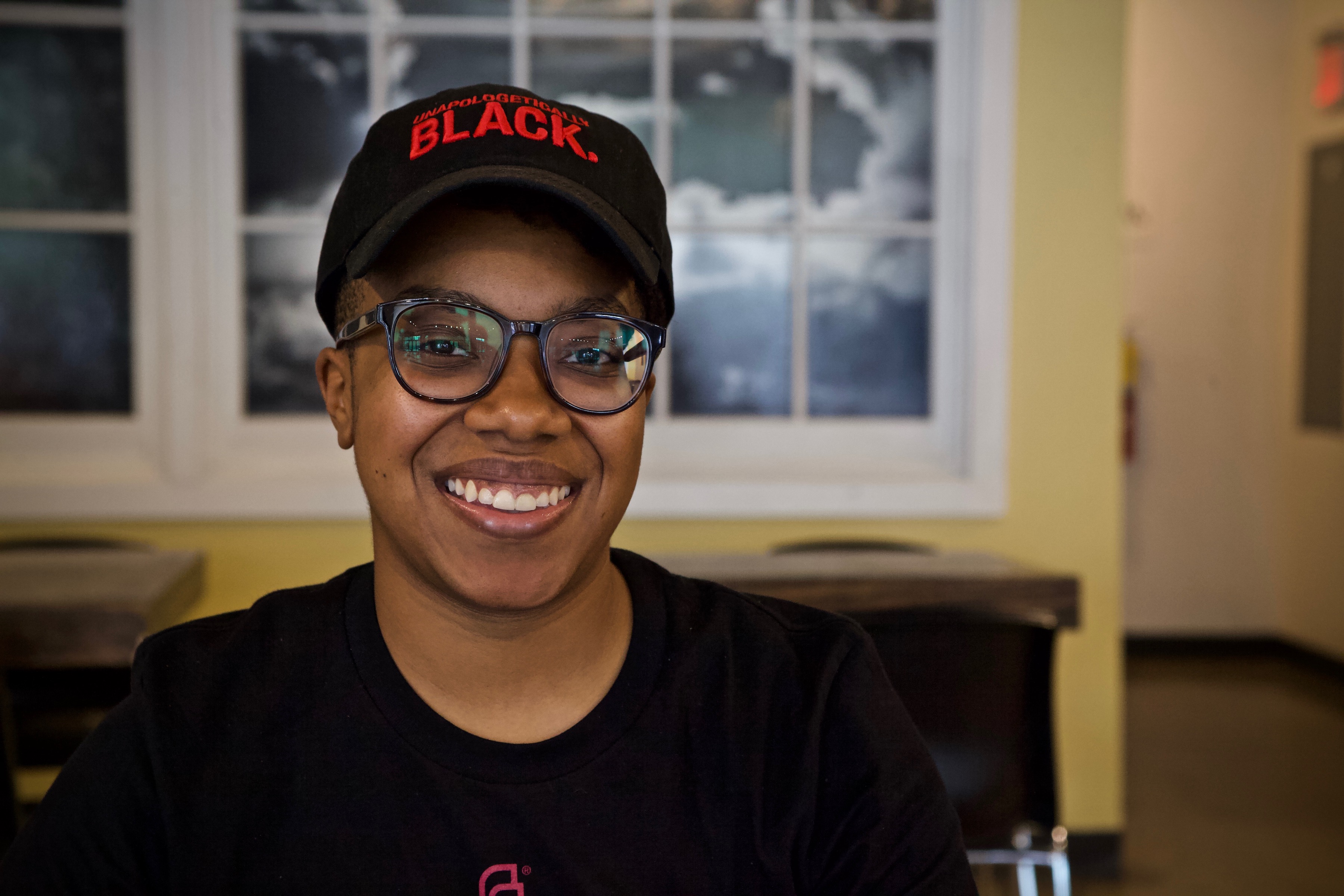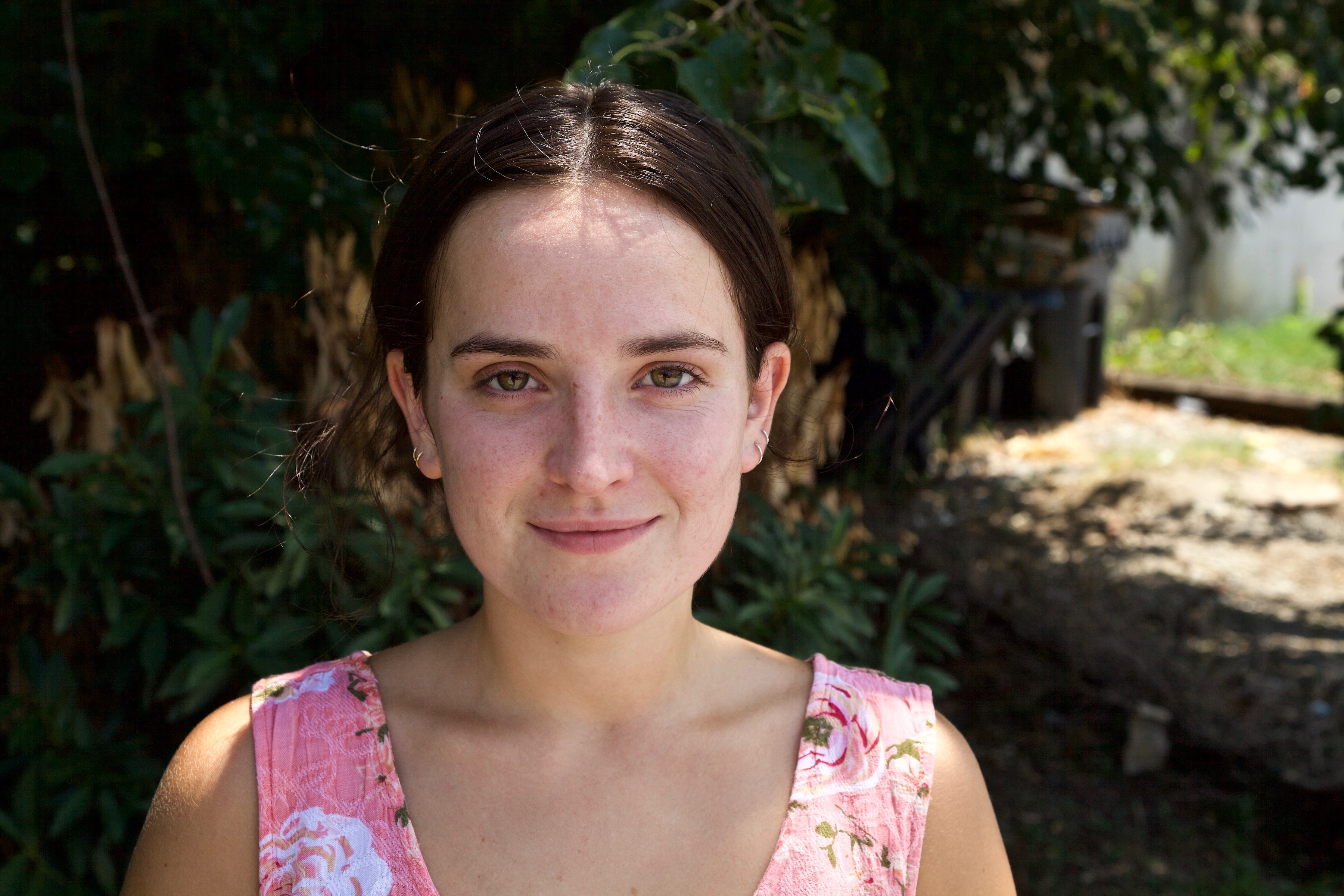ABOUT THIS SERIES
Led by recent shifts in the Supreme Court, abortion access is again in the crosshairs of politicians and states across the country. Activists on both sides of the issue are fighting for what they believe in - some to remove access, others to preserve it. This article is part of a package highlighting the voices of young, abortion-rights and anti-abortion activists in the Chattanooga area. Click here to read about young anti-abortion activists for the other side of the ongoing movement.
Kacy West's beliefs were shattered that night in her final year as a teenager. Her nearly two decades of life before that night had been shaped by a private religious school education, Christian music concerts and "Stop Killing My Generation" T-shirts.
"Until I was about 19 years old, I was pro-life all the way," she said.
Then, at a party, West was raped. She had been saving herself for marriage, she said. Now, she was pregnant by the stranger who sexually assaulted her.
"It's hard to come face-to-face with a long-held belief when it's about to stab you in the back," West said. " It changed overnight. I, really, [through] firsthand experience understood all of the mess that my black-and-white way of thinking didn't account for."
West said she had to stay quiet about her situation as a student at Lee University, a private Christian school in Cleveland, Tennessee. Topics such as abortion or reproductive health access were not discussed because it was assumed everyone on campus is anti-abortion, she said.
West had a miscarriage at around five weeks. She knew she would never have been able to provide a safe and healthy life for the child, she said. The time having to wrestle with what to do about the pregnancy, she saw the need to have choices. The experience started West on a path of being more vocal on an issue that, much like her college campus, is largely taboo in the Southeast: supporting abortion rights.
West, 32, is among an emerging group of abortion rights activists in the Chattanooga area. While their views may appear to be in the minority, many of the activists said there are more abortion rights supporters in Chattanooga than people realize.
The group faces immediate uphill challenges: Chattanooga is without an abortion clinic. Abstinence is often the emphasized form of sexual education. Stigma keeps women from talking about their experiences. In Nashville, state lawmakers hope to follow other states in the area in banning abortion statewide.
The burden of no access
The national abortion rights movement suffered several setbacks in recent years. The U.S. Supreme Court has a conservative majority again. Recently, the leading reproductive health provider, Planned Parenthood, left the federal family planning program rather than comply with new Trump administration rules that barred providers from referring women for abortions. The decision will cause the advocacy organization to lose tens of millions of dollars in federal funding. At the same time, Planned Parenthood is searching for a new president to lead the organization after months of internal conflict.
Earlier last month, members of the Tennessee Senate advocated for a bill that would ban all abortions in the state, following similar statewide bills that have passed in Georgia, Alabama, Kentucky, Mississippi and Louisiana. The earliest the bill could be voted into law is January when state lawmakers reconvene.
The increasing number of states restricting abortion motivated West to advocate. Thinking about her 6-year-old daughter, West has no choice but to speak up, she said.
"I just look at her and these bans scare me because if what happened to me ever happens to her, I'm afraid that she won't have a choice about what to do about it," she said.
West attended hearings related to the Tennessee bill and spoke with local politicians. When she can, she speaks with anti-abortion supporters about her views. Her argument leans into the Supreme Court's decision giving women the right to abortion access, how it improves women's health and the burden placed on women when access is restricted, she said.
Chattanooga's only abortion clinic closed in 1993 and was converted to a pregnancy resource center. Chattanooga was among 27 cities considered an "abortion desert," meaning there is more than 100 miles from the city to the nearest abortion clinic, in a 2018 study in the Journal of Medical Internet Research.
People in the Chattanooga area have to travel to Atlanta, Knoxville, Memphis or Nashville to access a clinic. They have to take off work, possibly arrange childcare and have reliable transportation to access these services. And people must make those arrangements more than once since Tennessee requires a 48-hour waiting period between the state-mandated counseling session and the abortion procedure. Then, the procedures are expensive, West said. The burden hurts low-income people the most.
"It just becomes an economic problem on top of an economic problem," West said.
Learning about the restrictions placed on women seeking an abortion in Tennessee was part of what motivated Melody Shekari to take an abortion rights stance. The Chattanooga lawyer had to take a position on the issue when she ran for the U.S. House of Representatives in 2016 and the Tennessee House of Representatives in 2018. Before that, the 31-year-old was what she described as a quiet supporter of the issue.
In her law practice, she often hears the stories of pregnant women who are put in difficult positions with few options and fewer available resources, she said.
"For us to now, say, in Chattanooga, at least, you have to drive two hours minimum to get services," Shekari said. "That's a hardship for a lot of people, in fact, for most of the people who need it the most."
Women in Tennessee often do not have access to basic information about reproductive health, such as a list of doctors who are not steering pregnant women to certain kinds of care, Shekari said. Women who seek abortions, or even just more information about reproductive health, can be pushing against what their families and faith say.
"I do wonder what our community would look like if we had comprehensive sex education early on, if we had access to resources that people could go to that were non-religious and had no agenda, just wanted to provide your information so you could make your own choice," she said.
For many years, abortion rights work in Chattanooga was done without a formal organization. Any work, any conversations, were largely underground, Shekari said.
"It's seen as a taboo thing," Shekari said. "And I think that's dangerous."
Shekari is part of a new local group working to change that.
From underground to organized
As spring neared its end this year, a small group of Chattanooga residents began organizing an abortion rights group to advocate for abortion access, as well as other reproductive rights, such as access to birth control and sex education.
The Chattanooga Health Advocacy Team (CHAT) holds regular meetings and shares information on its Facebook page. The group is pushing against the feelings of forced silence and isolation pro-choice people in Chattanooga can feel, said Shannon Hardaway, one of the founding members.
"There's a lot of pro-choice people in Chattanooga, but we don't have a Planned Parenthood," Hardaway said. " Sometimes you feel kind of alone as a pro-choice person in this city because there's no outspoken support."
Hardaway, 34, has always been in favor of abortion rights, though she has to watch her words around some friends and family, she said.
In 2007, Hardaway had an abortion when she was unable to carry a pregnancy to term. She said she has discussed her experience with people in Nashville and Knoxville but never Chattanooga.
She did not realize there was much abortion rights support here, so connecting with other local, abortion rights residents through the Chattanooga Health Advocacy Team was eye-opening, Hardaway said. CHAT is providing a safe place for people to gather and share ideas, she said.
However, the advocacy team may have more local support than the work of regional legislators suggests. More than half of Americans think abortion should be legal in all or most cases, according to a 2019 survey by the Public Religion Research Institute. The survey also found that 40% of Tennessee residents and 49% of Georgia residents believe abortion should be legal in all or most cases. In no state are at least a quarter of residents in favor of banning abortions in all cases.
Bringing comprehensive sex education to local residents is among the issues the advocacy team wants to address. Several members said the lack of such education drives dangerous misconceptions around pregnancy and abortion.
Jordan Scruggs attended a private school where preaching abstinence was the only sex education. Scruggs did not have internet access at home, and web restrictions on public computers made searching for such information impossible.
What Scruggs called the "never-ending circle of no information" continued outside of school because people think the topic is taboo.
"It's the culture of not just shaming abortions but it's the shaming of our bodies," Scruggs said. "We're taught that you don't talk about this kind of stuff. You don't talk about anything like that. We talk around topics."
In college, Scruggs was able to access more information, which motivated Scruggs to spend most of the last decade advocating for the same level of access for everyone. Scruggs helped found CHAT and is a steering committee member of Healthy and Free Tennessee, a Memphis-based advocacy organization.
The majority of people Scruggs knows who have had abortions are people of faith, Scruggs said. Each case is different and complicated, Scruggs said, but the conversation around abortion has become narrowed.
"It angers me a lot to have people demonize [people who get abortions] because I know these are people who I love," Scruggs said. "I know these are good people. These are my friends. They're my neighbors. They are other lives that should be treated just as equal as me, someone who has not had an abortion."
The fight for access and information is a fight for individual rights and a fight that is motivated by faith, Scruggs said, citing the two great commandments of the Christian faith to love God and love others.
"It's a shame that people look forward to defunding [Planned Parenthood] and shutting them down," Scruggs said. "It's very un-Christian-like. It's very un-Christian-like to hate somebody and to punish somebody for having a life and living it. There are not stipulations on Christ's love or God's love."
Breaking a silence
Chattanooga may be in a predominantly conservative, anti-abortion state and region, but the health of individuals and the community depends on not staying silent on advocating for abortion access, said Alice Gilmore.
Gilmore, 25, is the founder of Make Noise 423, an advocacy organization for discussing seemingly taboo topics.
In May, the group hosted an abortion storytelling event at JJ's Bohemia at which several women prepared their stories and several other women in the audience got up during an open mic opportunity to talk about their abortion experiences.
"You get people assuming that all abortion experiences are the same and that everyone's stories are the same," Gilmore said.
In a place where shame and stigma can force silence, women sharing their lived experiences can be healing for them, as well as informative for the community, Gilmore said. The event humanized an issue that is too often polarized and divisive, she said.
"In order to introduce truth into the dialogue, we learn the most I think from people who have actually been through the things we are talking about and debating about," Gilmore said. " If we don't talk about it, the judgment that's cast upon you, [by] different societies and cultures, it can be debilitating."
The Chattanooga Health Advocacy Team can benefit the community by amplifying the voices of women and spreading awareness about the current restrictions on reproductive health, Gilmore said. Last week, she attended the congressional hearings in Nashville on the proposed bill that would ban abortions in the state.
While there is much work for abortion rights advocates to do in Chattanooga and throughout Tennessee, Gilmore said there is reason to hope.
"It's hard to create change without having a community that's advocating for this change," she said. "I think it's a really big step in the right direction that CHAT's formed. I think it has a lot of potential to grow and to galvanize the community on this issue."
The growth may need to happen fast for the four-month-old group. It could face a major battle when the state's General Assembly reconvenes in January.
Contact Wyatt Massey at wmassey@timesfreepress.com or 423-757-6249. Find him on Twitter at @News4Mass.
